Every Assassin’s Creed Game Ranked Worst to Best
Sharpen your blades and queue up your favorite sea shanty, because we're ranking every game in the Assassin's Creed franchise.
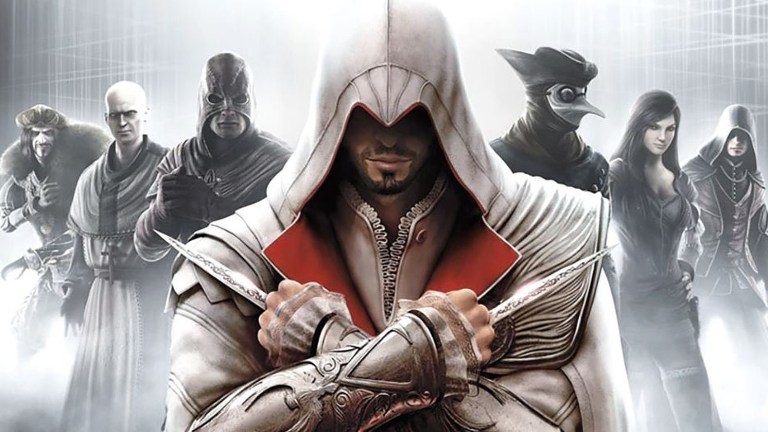
There’s a little bit of something for everyone in the Assassin’s Creed series. No franchise has so effectively blended stealth and action, while also occasionally throwing in completely random new twists like naval battles and multiplayer so well for so long. And all of this is in the context of a story that takes place across thousands of years and multiple, very different time periods.
But which Assassin’s Creed games rank among the best of the best? While no title in the main series is considered to be especially bad, there’s certainly a significant difference in quality among the 13 mainline games released so far. As the series looks to return to its roots with the new Assassin’s Creed Mirage, we thought we would first look back at the rest of the series and rank the mainline Assassin’s Creed games from worst to best.

13. Assassin’s Creed Rogue
My gamercard tells me I played through Assassin’s Creed Rogue, but honestly, I had a hard time remembering much of the experience until it came time to write this piece.
Rogue is…fine. Even bringing up the rear on this list, it’s not really a bad game, but the biggest problem with it is that it feels more like DLC for the far superior Black Flag than a separate game. Don’t get me wrong, playing as a Templar is cool, and there’s some really beautiful scenery while sailing the Arctic (especially if you play the remastered edition in 4K), but aside from the story, the game doesn’t really do anything to stand out, and then it’s all over in about 10 hours (the shortest campaign of any game in the series).
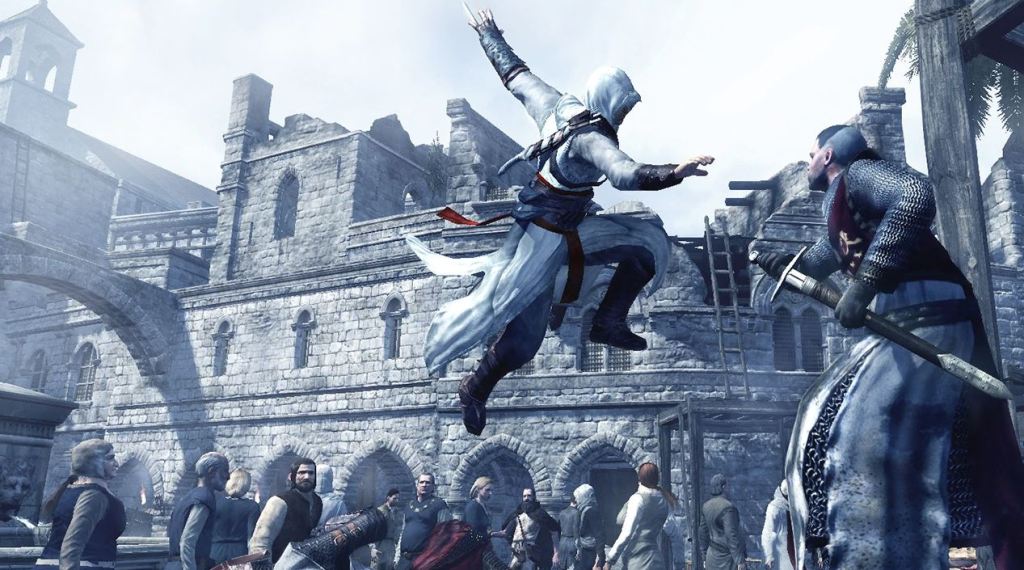
12. Assassin’s Creed
Remember how awesome Assassin’s Creed looked when it was first announced? Those huge crowds! The massive open world! The promise of assassinating targets in multiple ways! And then it came out, and it just couldn’t quite live up to the hype.
Just like with Rogue, the original Assassin’s Creed is not bad. It hasn’t even aged that poorly for a game that came out in 2007. It’s just very obvious that the team wasn’t quite sure what direction the series would take, so now it feels more like a tech demo for later games.
Assassin’s Creed actually has the exact opposite problem of more recent titles in the series: there’s just not much to do. Beyond the main missions, you can collect flags, and that’s about it. Still, you’ll catch a lot of glimpses at potential greatness here. If Ubisoft ever goes back to remake this game with more content, it could really be something special.
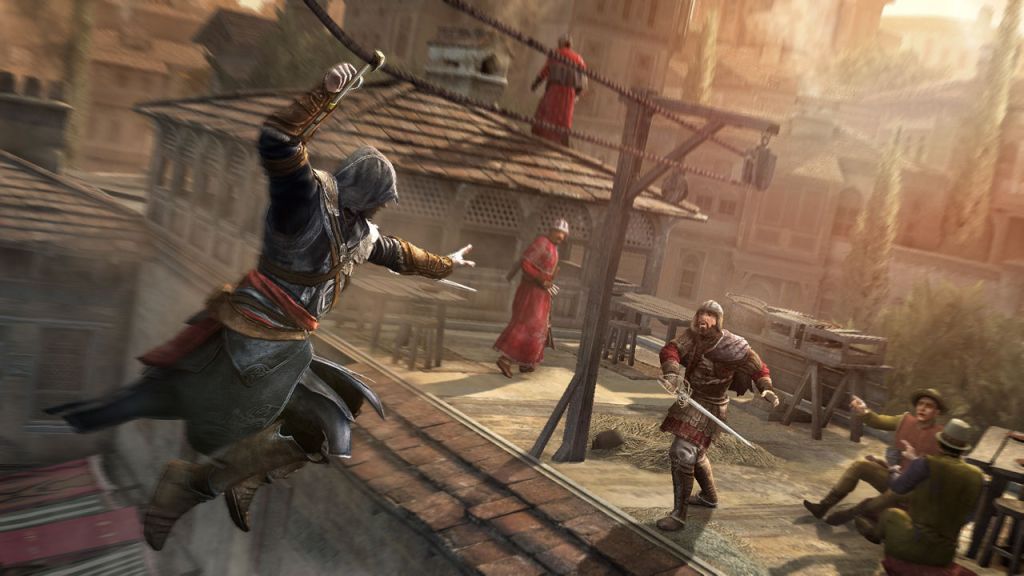
11. Assassin’s Creed: Revelations
The second Assassin’s Creed game was such a huge hit and massive improvement over the first that of course Ubisoft wanted to follow it up as quickly as possible with more Ezio adventures. The first direct sequel is still pretty good, but with Revelations, Ubisoft went back to the well one time too many. There’s just not a whole lot here to justify this game’s existence.
The big new addition to movement, a hook blade that allows the aging Ezio to jump higher feels pretty unnecessary, and the addition of tower defense levels was so widely disliked that they’ve (thankfully) never been seen again in the series. Even the return of Altair, while welcome, feels a little underwhelming. Revelations remains a game for people who want more Assassin’s Creed II and still weren’t satisfied after Brotherhood. For those fans, it’s a must-play. For everyone else, it’s a somewhat forgettable entry in the storied franchise.
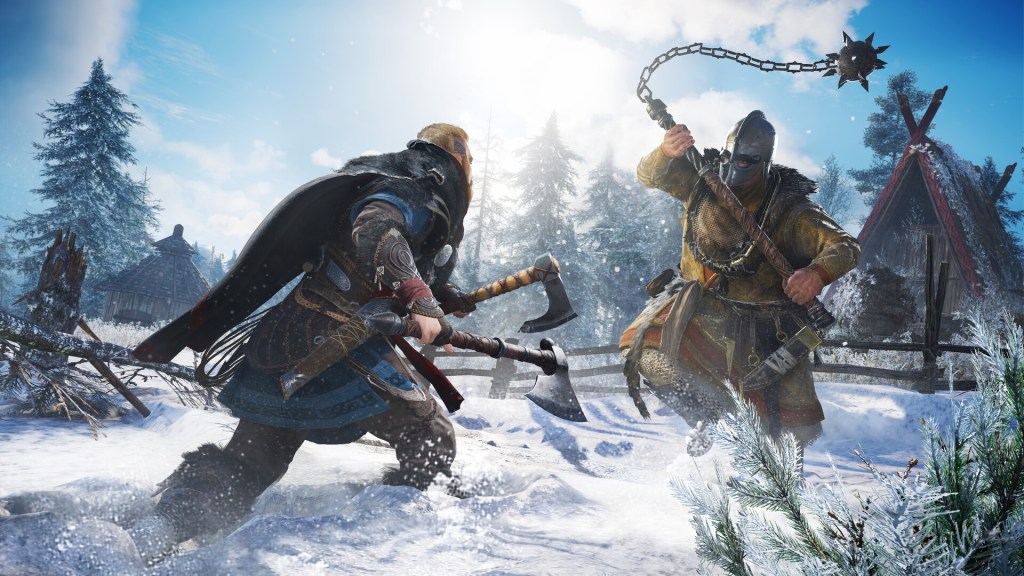
10. Assassin’s Creed Valhalla
Valhalla has plenty of fans, but my first question to them would have to be, “Have you actually played the main quest to the end?”
Valhalla is a huge game, with remarkably little variety between missions. Go to a new area of England, sneak around a bit, and engage in the exact same raid in similar-looking towns. And it just goes on like this for about 80 hours with a story that never really feels like it’s going anywhere.
That’s not to say Valhalla is bad though. The moment-to-moment combat remains enjoyable throughout the lengthy adventure with plenty of customization, and the Viking aesthetic is awesome (even if the mythos gets somewhat incomprehensible the more it delves into Norse mythology). If there’s such a thing as a game being “too big,” Valhalla is definitely it. It’s really hard to argue that this is the weakest of three Assassin’s Creed games since the series took a turn into the action RPG genre.
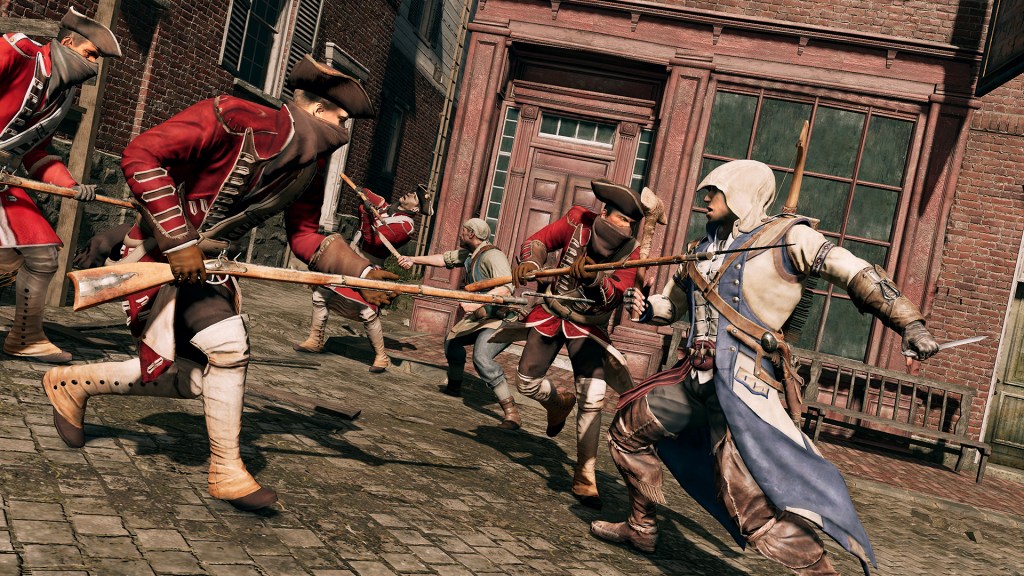
9. Assassin’s Creed III
Colonial America is a criminally underutilized setting in video games, and while Assassin’s Creed III doesn’t quite take full advantage of its time period, there’s still a lot to like here.
The move to the colonies means there’s a lot more wilderness to explore than in previous games, so you’re now jumping between trees instead of just buildings. And new protagonist Connor honors his Native American heritage with tomahawks and bows and arrows, which help the gameplay feel significantly different from its predecessors. This was also the game that introduced naval battles to the series: a welcome idea that later entries would significantly improve upon.
Really, the biggest issue here is also its selling point: early America. To stay somewhat historically accurate, the cities of the era just weren’t as large and fun to explore as locales in earlier games. Also, for those following the modern-day portion of the story that promised a big 2012 apocalypse and all sorts of cool things from the super-advanced First Civilization, the ending is remarkably anticlimactic. But then again, Ubisoft was never going to let something pesky like the end of the world decisively conclude one of its biggest franchises.
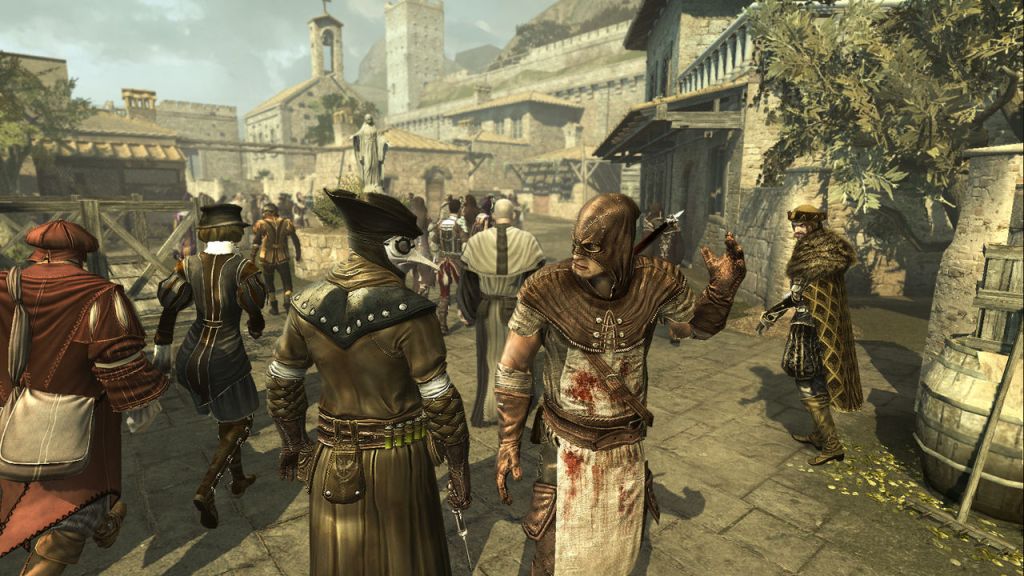
8. Assassin’s Creed Brotherhood
Released just one year after the landmark Assassin’s Creed II, it’s no surprise that Brotherhood feels more like an expansion than a full-blown sequel, but what’s here is done quite well. There are some welcome minor changes to the combat that encourage more aggressive play, but the big addition is the brotherhood itself: your very own league of assassins to call in for help or even send on missions.
And while it’s offline now, Brotherhood was the first game in the series to introduce online multiplayer with its unique cat-and-mouse gameplay. It was never Call of Duty in terms of popularity, but it was well made and attracted a small but dedicated community over the years. Bringing this mode back in a future Assassin’s Creed game would certainly be welcome.
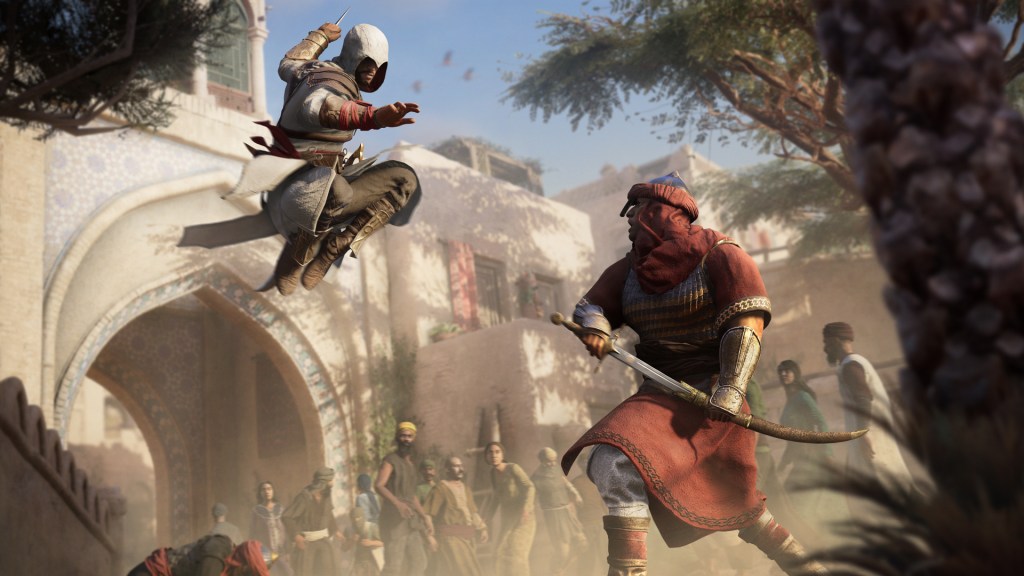
7. Assassin’s Creed Mirage
In some ways, Assassin’s Creed Mirage is surprisingly close to that hypothetical aforementioned Assassin’s Creed remake. Though not a dead ringer for the original installment in this franchise, it does harken back to the “core” AC experience by focusing on parkour movements, stealthy takedowns, and performing minor side tasks that don’t get in the way of that main experience. By boiling the formula down to its core components (with a few twists), Mirage rediscovers what made them so much fun in the first place.
Unfortunately, the game just doesn’t have as much to offer as the very best entries in this franchise. Its shorter runtime (15-25 hours or so) may actually be a draw for some, but Mirage doesn’t really try to forge its own new path nor does it even attempt to match the scope of games like Black Flag. As such, it can sometimes feel like a playable proof of concept that is certainly well done enough to warrant a follow-up. – Matthew Byrd
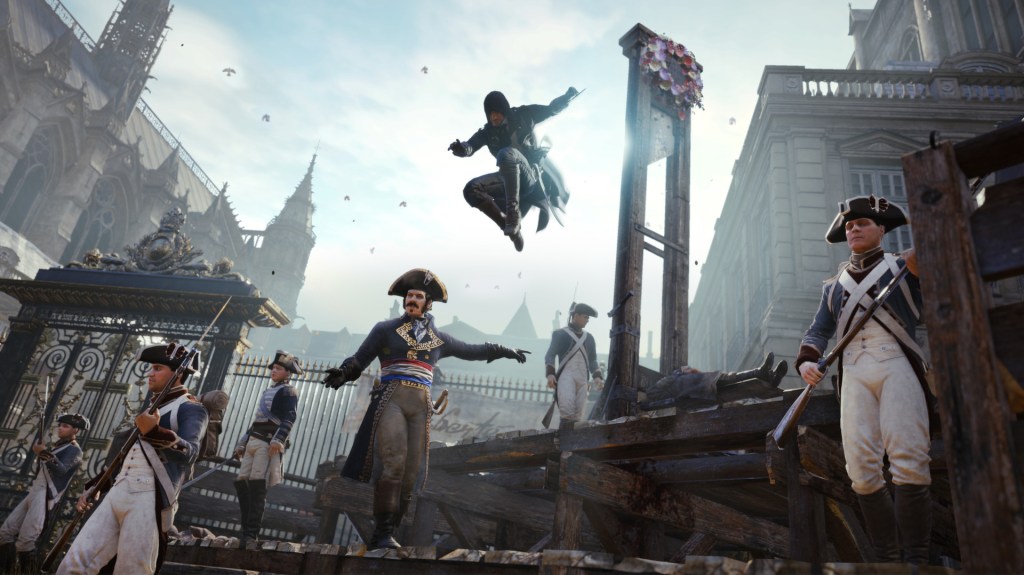
6. Assassin’s Creed Unity
Assassin’s Creed Unity was rightfully bashed by reviewers and gamers alike for a host of technical issues at launch. If we were judging the initial release of Unity, it would easily be at the bottom of the list. But here’s the thing: if you go back to it now, those issues are long gone. What’s left is a stunning recreation of Paris during the French Revolution, with some of the largest and most detailed crowds in any game.
The one criticism of Unity that’s still apt is that it’s maybe a little too similar to Assassin’s Creed II, right down to the protagonist, Arno. Then again, is that a bad thing? Yes, the similarities are there, but it looks better, plays more smoothly, and even adds online co-op to the mix. If bad reviews turned you off of Unity in 2014, it’s well worth checking out now.
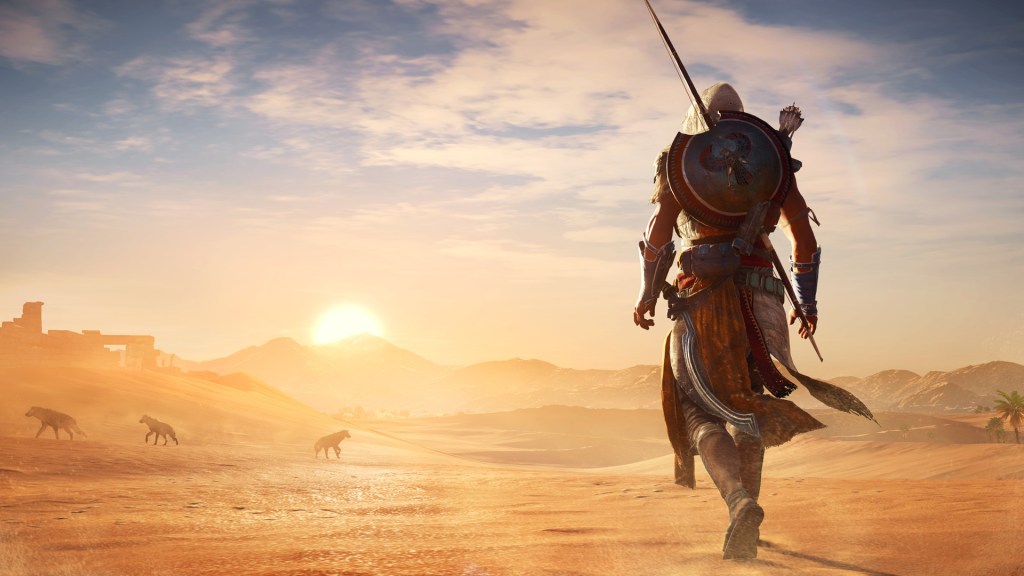
5. Assassin’s Creed Origins
With a brand new combat system, RPG mechanics, and more open-ended missions, Assassin’s Creed Origins was a welcome reinvention of the franchise that shook things up without ditching too many of the things fans loved about the series.
Origins‘ long-requested ancient Egypt setting actually exceeded almost everyone’s expectations. While the series has always played a little loose with historical accuracy, you’ll still learn a lot about the time of the pharaohs. Oh, and you can fight mummies in the DLC too, which is, admittedly, significantly less true to history. Probably.
Of course, there are still signs of the encroaching bloat here that would eventually overwhelm the series with Valhalla, and sometimes the game requires a little too much grinding to move on to the next main mission, but you could do much worse in an action RPG than Origins.
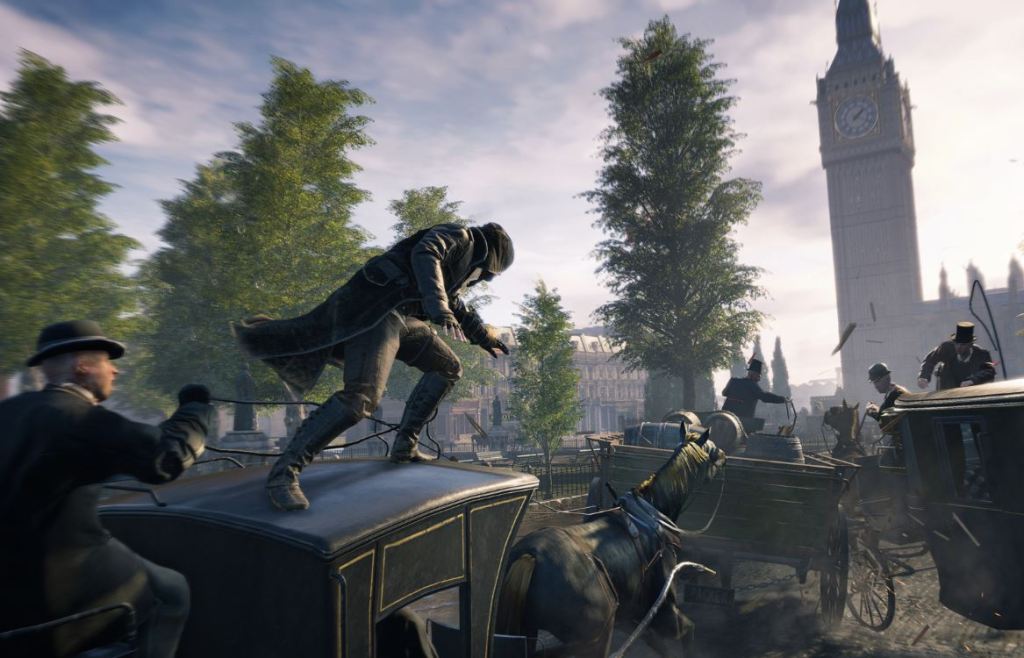
4. Assassin’s Creed Syndicate
Until Assassin’s Creed Mirage, Syndicate was the last of the “traditional” Assassin’s Creed games released before the series’ action RPG pivot. Ubisoft saw the game as something of a failure as it sold lower than its predecessors, but that had nothing to do with its actual quality.
Syndicate built on a lot of the lessons learned with Unity, but this time moved the action to a pitch-perfect recreation of Victorian London. Twin protagonists Jacob and Evie Frye are some of the most likable main characters in the series, and each has their own strengths. Era-specific weapons like brass knuckles and cane swords are ridiculously fun to use in combat, and while the carriages received something of a mixed reception, I personally found them to be an enjoyable addition. While the game also didn’t go full RPG, but you do get a hint of the upgrade system that would be introduced in Origins.

3. Assassin’s Creed II
Assassin’s Creed II is a lot like Street Fighter II or Mega Man 2. In all three cases, the series started off with a lot of promise, but a few missteps kept the first games from achieving greatness. It was the sequels that refined everything and created some real classics.
Everything about Assassin’s Creed II is a huge improvement over the original. Combat and movement are smoother. There’s thankfully much more to do (with hardly a boring side mission in sight). Perhaps most importantly, Ezio is a much more likable protagonist than Altair. There’s a reason why Ubisoft put him in so many games and even now he’s still kind of the face of the franchise.
If nothing else, Assassin’s Creed II deserves a high place on any list of the series’ best games for its absolutely ridiculous and unintentionally hilarious final boss battle: a fist fight with the pope in the Vatican.

2. Assassin’s Creed Odyssey
Yes, Odyssey has the same problem as Origins and Valhalla in that it almost feels too big at times. However, unlike those games, Odyssey‘s missions are more varied, and the Greek setting is just so much fun to explore that becomes more than the sum of its parts to become one of the best games in the series.
While Assassin’s Creed games are known for their open-ended design, Odyssey truly offers multiple ways to approach almost every situation. And then there’s the awesome naval combat (among the very best in the franchise). You can spend hours just sailing around and customizing your ship.
And while story hasn’t always been the strong point of these games, Odyssey absolutely nails it here with a lengthy epic about both saving the world and a family that can play out very differently depending on the choices you make. Then, there’s another cool endgame twist regardless of whichever way those choices play out. If Odyssey has a fault it’s that it doesn’t always feel like an Assassin’s Creed title, yet it’s a better game for the risks it takes with both its narrative and gameplay.
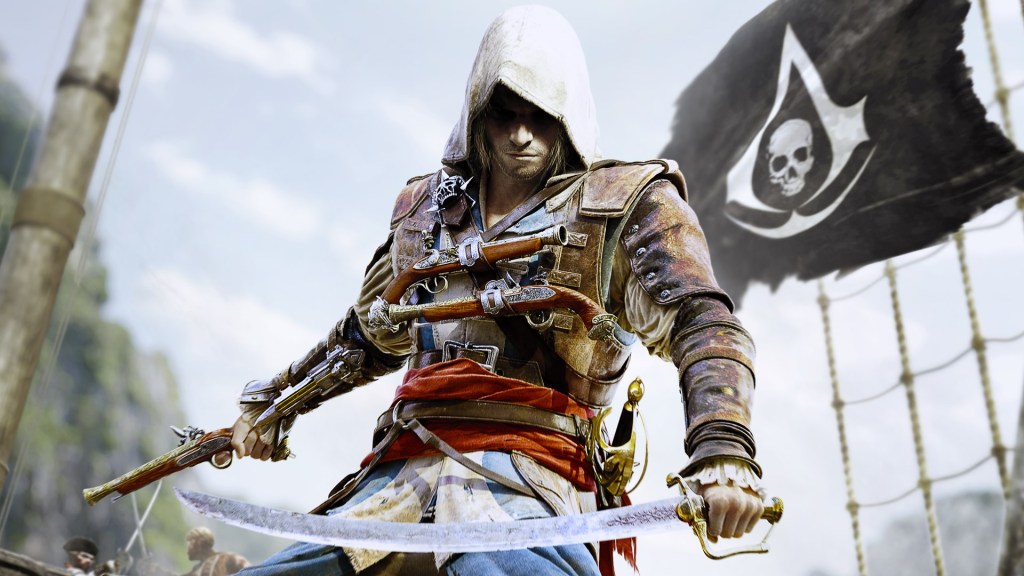
1. Assassin’s Creed IV: Black Flag
After Assassin’s Creed III conclusively ended the story of Desmond Miles, it wasn’t entirely clear where the series would go next. As strange as it may sound, injecting a pirate theme and Caribbean setting into the established Assassin’s Creed formula was exactly the bold new direction the series needed.
Black Flag is a pirate game first and an Assassin’s Creed game second. The classic stealth-action gameplay is here, and it’s great, perfectly refined from the last few titles, but that’s not the real draw. Black Flag puts you in command of your very own upgradeable pirate ship and sets you in the middle of the Caribbean during the golden age of piracy to loot, plunder, and sing sea shanties with your crew. It’s literally everything you could ever want from a pirate game.
It’s rather baffling that more developers haven’t tried to copy this formula over the last decade, but then again, if Ubisoft’s long-delayed Skull and Bones ever sees the light of day, it’s supposed to be the spiritual successor to Black Flag we’ve longed for.
